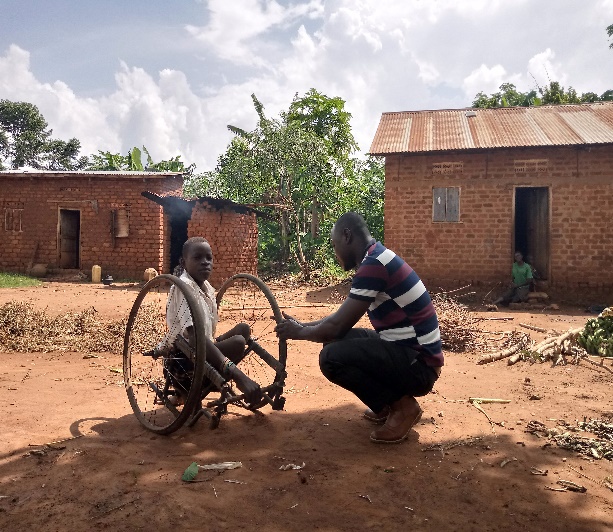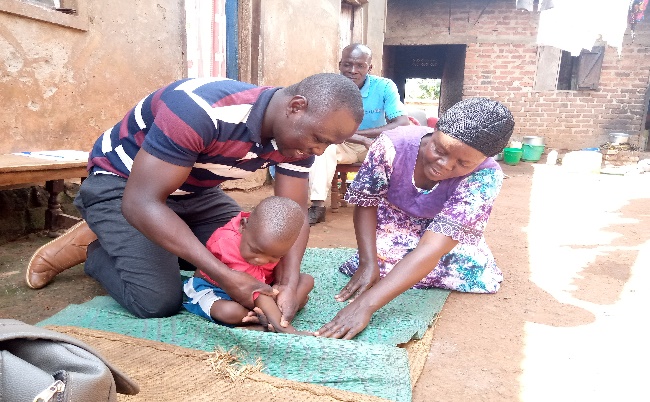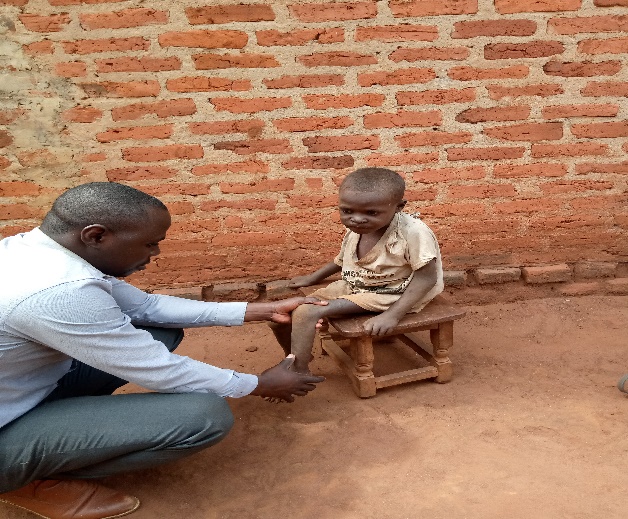
On several occasions, the responsibilities of caring for children with disabilities, such as cerebral palsy—a neurodevelopmental disorder that affects the brain’s development—are left to mothers, while very few men take on the role.
Worse still, some men abandon their families upon learning that their child has a disability, as if it is the woman’s fault for giving birth to such a child.
Meanwhile, women are often seen struggling to make ends meet for their children, but they do not give up.
However, some men do stand by their families in caring for children with disabilities. They actively contribute by seeking financial support while also physically attending to their children’s needs. They bathe them, change their clothes, feed them, massage them, and take on other essential roles. This provides women with hope, reassuring them that they are not alone and that they are not solely responsible for bringing such a child into the world.

Surprisingly, research has shown that some women also abandon their homes, leaving the responsibility of caring for children with cerebral palsy to the few men who are committed to looking after their children with disabilities.
In Uganda, based on a population-based study, the prevalence of cerebral palsy is estimated to be 2.9 per 1,000 children. Children younger than 8 years are more likely to have severe cerebral palsy than older children. However, the prevalence is likely to be under estimated due to survival bias. Children with CP often have disturbances in hearing, vision, cognition and communication, behavioural problems, seizures or convulsions and high burden of malnutrition because of feeding difficulties.
Globally, the prevalence of cerebral palsy is estimated to be 2.4 per 1,000 children which approximates to 50 million people living with cerebral palsy. but there is regional variation with the prevalence being higher in low- and middle-income countries compared to high income countries.
Celebral Palsy has different types such as Spasticity Celebral Palsy which is sub divided into Spastic Hemiplegia, Spastic Diplegia, Spastic Quadriplegia among others. And Non-Spastic Celebral Palsy which is further divided into sub other types such as Dystoic cerebral palsy, Chorea Celebral Palsy, Arthetosis cerebral palsy, among other types.
Hudson Mugisha lives in Kawube Zone Busabala, Makindye Ssabagabo, with six children. His fifth child, who is seven years old, Isaac Mugisha has a neuro brain development. Hudson began noticing unexplained changes with his son, such as uncontrollable crying and violent behavior. However, a subsequent check-up by health workers revealed that the baby had Celebral Palsy, a condition he had never heard of before.
“Although episodes of malaria had decreased, “three months later, I learned that Isaac had a brain disability. I was bewildered, broken, and devastated by the news,” he recounts
The health workers explained that Isaac’s growth and development would not be like that of a typical child and that his condition was unlikely to change anytime soon. This realization made him aware that Isaac’s moods could change swiftly, for example, his temper was unpredictable, and he could lose his emotions very quickly. Mugisha believed that understanding Isaac’s changes was essential and that he needed to adapt to what he learned.
Mugisha acknowledges that the situation led him to reflect on all his sons. His first-born died when he was just twenty-one days old, followed by Isaac, who was diagnosed with Celebral Palsy. His third son often falls ill, though he has no specific disease. The last three children are healthy. This situation made Mugisha contemplate, “The person who bewitched us did it so well. How do I navigate all these challenges?” he added
Previously, Mugisha held several part-time jobs, including construction electrician and social worker working for various employers. These jobs were offered on an as-needed basis, with employers calling to notify him of available work. However, with Isaac’s condition, he found it increasingly difficult to manage all these jobs, especially when they weren’t his primary responsibilities. So balancing jobs became extremely challenging because he was essentially an employee. Until he embarked on his skills in making and mending shoes. “I can work for a short time and then return to care for Isaac.” He noted
He can never forget the day his wife abandoned Isaac with him. In the first three years of their marriage, the couple lived together happily. However, Isaac’s condition changed the dynamics between him and his wife. He said, “Every time I glanced at my wife, I could see that she was not happy with me or the child. Carrying Isaac every day became unbearable for my wife and the pain of caring for a sick child torturous”.
One day the mother called him while he was in Mbarara to inform him that she was leaving. Mugisha asked his wife why she was leaving. She replied, “I left your son locked in the house. Please ensure you find your way back home. I am done with this relationship.” Without hesitation, I boarded a bus from Mbarara to Kampala to find my boy.
Mugisha recalls upon arriving home, he found Isaac alone in the house. He said, “from this moment on, I am both your mother and father for eternity. Your mummy, my wife abandoned us today for good. I will stand by you.
Mugisha acknowledges Baby Ubuntu, a community-based program led by health workers and expert parents of children with neurodisabilities. Ubuntu provides the emotional and practical support caregivers need to maximize child development.
Simon Kimbowa is an occupational therapist working with Child and Family Foundation Uganda says, traditionally mothers are the primary care givers of children. “You find very few fathers have taken part in caring of children with Celebral Palsy.” He notes
In his experience, caring for children is also attached to religion for example among the moslems, a bigger percentage of fathers take an extra step in rehabilitation of children with disability. “While men or fathers from other religions are not heavily involved in rehabilitation for children. ” He shares.
He says that when you find a father who is involved in rehabilitation of their children, they will do it wholeheartedly. “For example, Mugisha is involved in the rehabilitation of his child, and does it single handily. “This gives courage to other fathers to do the same”. However, some fathers relegate their responsibility and normally take such children to the grandparents or relatives, and this deprives children of building a relationship with their parents.
The good news is, the tide is changing gradually, more and more fathers are taking responsibility in the rehabilitation of their children. This has motivated them and given them courage that these children will have a better future”.
Another male care taker is Fidel Byamukama married to Sarah Ahimbisbwe, and are residents of Nakulabye Suburb. The couple has three children. Their daughter Maria, is three years old. When Maria was three months old, her parents first noticed she was not developing like other children.
Byamukama noted that Maria’s mother, his wife, is a stay-at-home mom who handles all the household responsibilities. “My wife cares for Maria at all times and manages everything at home,” he says.
He also mentioned, “My role as a father is to contribute finances to help in different ways like buying food and diapers, and take Maria to the hospital.”

Meanwhile, Ahimbisbwe, Maria’s mother, shared, “Caring for Maria has taught me patience” she said. Looking after a child with a disability is unique, the child may not eat or drink like other children. If you offer her food and she refuses, you have to try something else.
Similarly, Lucy Mbabazi, a soft-spoken woman with great patience and tolerance, living in Nansana. She has two children, both girls. “Weldon is eleven years old and is a special girl compared to her sister. This is due to brain damage, commonly known as Cerebral Palsy,” she explained.
The first time I realized that my child was special was when she was four months old. When I compared her to other children of the same age, they were growing and developing normally, but my baby wasn’t siting, her neck was floppy her legs were weak and she wasn’t making any eye contact. Inwardly, I asked myself a million questions. I remained patient until she was nine months old, then decided to take her to the hospital to understand her condition. The health workers informed me that she would likely never crawl, stand or develop like a typical child.

As a parent, I know I have to be patient, as my child may not develop to the same extent as a typical child. “My baby’s brain was damaged, particularly the neural nerves, during childbirth. In simple terms, this is a mental health challenge. I felt devastated—my heart was torn apart, and I was heartbroken. Honestly, my thoughts immediately went to B… hospital, knowing that my baby’s milestones would be much slower and not like those of other babies.
We encourage parents to work together to ensure that children living with Cerebral Palsy and other forms of disabilities are given the life and opportunities every child deserves
Joyce Namugambe/Rebecca Birungi





